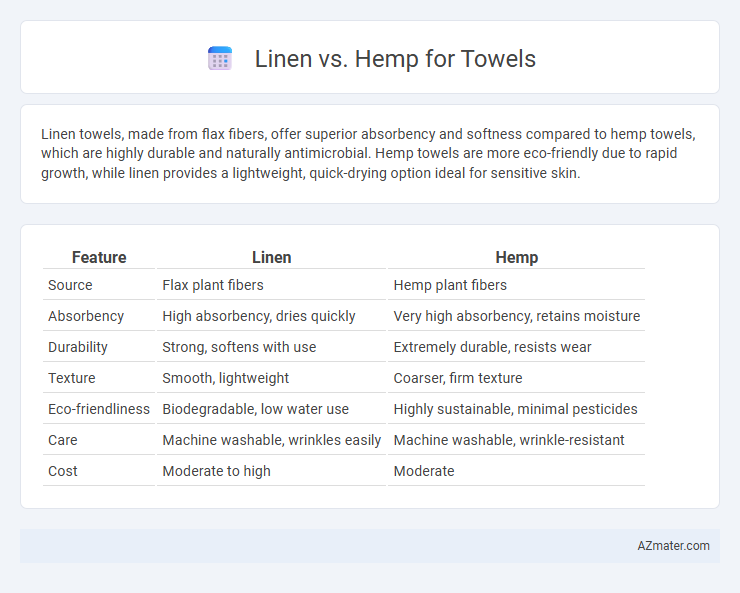Linen towels, made from flax fibers, offer superior absorbency and softness compared to hemp towels, which are highly durable and naturally antimicrobial. Hemp towels are more eco-friendly due to rapid growth, while linen provides a lightweight, quick-drying option ideal for sensitive skin.
Table of Comparison
| Feature | Linen | Hemp |
|---|---|---|
| Source | Flax plant fibers | Hemp plant fibers |
| Absorbency | High absorbency, dries quickly | Very high absorbency, retains moisture |
| Durability | Strong, softens with use | Extremely durable, resists wear |
| Texture | Smooth, lightweight | Coarser, firm texture |
| Eco-friendliness | Biodegradable, low water use | Highly sustainable, minimal pesticides |
| Care | Machine washable, wrinkles easily | Machine washable, wrinkle-resistant |
| Cost | Moderate to high | Moderate |
Overview: Linen vs Hemp Towels
Linen towels, derived from flax fibers, offer exceptional softness, absorbency, and quick-drying properties, making them ideal for sensitive skin and everyday use. Hemp towels are highly durable, antimicrobial, and environmentally sustainable, providing a rougher texture that enhances exfoliation and long-term resilience. Both materials excel in breathability and moisture-wicking, but linen is favored for comfort while hemp stands out for strength and eco-friendliness.
Fiber Origins and Sustainability
Linen towels, derived from the flax plant, offer a smooth texture and natural antimicrobial properties, making them highly durable and suitable for sensitive skin. Hemp towels originate from the hemp plant, known for its fast-growing nature and minimal need for pesticides, contributing significantly to sustainable agriculture. Both fibers excel in sustainability, yet hemp's ability to regenerate quickly with less water and chemical input often positions it as the greener choice for eco-conscious consumers.
Texture and Feel: Comparing Comfort
Linen towels offer a smooth, soft texture that becomes increasingly plush with each wash, providing a lightweight and breathable feel ideal for sensitive skin. Hemp towels showcase a coarser, more robust texture that delivers exceptional durability and absorbency, making them suitable for heavy-duty use. Both fabrics excel in natural comfort, but linen prioritizes softness while hemp emphasizes strength and longevity.
Absorbency and Drying Speed
Linen towels, made from flax fibers, offer high absorbency and quickly wick moisture away from the skin, making them ideal for efficient drying. Hemp towels provide superior absorbency compared to many natural fibers due to their hollow core fibers, allowing them to hold more water while remaining breathable. Both linen and hemp towels dry faster than cotton, with hemp's durability giving it an edge in maintaining absorbency and drying speed over time.
Durability and Longevity
Hemp fibers offer superior durability compared to linen, withstanding frequent washing and heavy use without losing strength or texture. Linen towels, while softer and more absorbent, tend to show wear and tear faster under continuous friction and moisture exposure. Hemp's natural resistance to mold and UV degradation ensures longer towel lifespan, making it ideal for prolonged use in humid or outdoor environments.
Antibacterial and Hypoallergenic Properties
Hemp towels exhibit strong antibacterial properties due to natural phytochemicals, making them effective at inhibiting bacterial growth and reducing odor, while linen towels also possess mild antibacterial traits from flax fibers. Both hemp and linen are hypoallergenic, suitable for sensitive skin, but hemp's coarse fibers provide enhanced breathability and faster drying, which further minimizes bacterial accumulation. Choosing hemp towels supports superior hygiene and comfort, especially for users with allergies or skin sensitivities.
Maintenance and Care Instructions
Linen towels require gentle washing in cold water and should be air-dried or tumble-dried on low heat to maintain their softness and durability. Hemp towels are highly absorbent and durable but need washing in warm water with mild detergent, avoiding fabric softeners to preserve their natural fibers. Both materials benefit from occasional sun drying to naturally disinfect and keep them fresh.
Environmental Impact
Linen towels, made from flax fibers, require less water and pesticides compared to conventional cotton, making them a sustainable choice with low environmental impact. Hemp towels offer even greater eco-friendliness due to the plant's rapid growth, minimal need for fertilizers, and its ability to improve soil health while sequestering carbon. Both fibers are biodegradable and durable, but hemp's superior resource efficiency and soil benefits make it a leading option for environmentally conscious towel production.
Price and Value Comparison
Linen towels typically have a higher price point due to the labor-intensive processing of flax fibers, while hemp towels offer a more affordable option with similar durability and absorbency. Hemp's natural resistance to mold and bacteria enhances towel longevity, providing greater value over time despite its initial moderate cost. Choosing hemp towels often results in better cost-efficiency for eco-conscious consumers seeking sustainable, long-lasting textile products.
Choosing the Best Towel for Your Needs
Linen towels offer superior softness and quick-drying properties, making them ideal for daily use and sensitive skin, while hemp towels boast exceptional durability and natural antimicrobial benefits, perfect for heavy-duty or eco-conscious consumers. Consider hemp if you need a long-lasting towel that resists mold and odors, whereas linen suits those prioritizing lightweight, breathable fabrics with a luxurious feel. Evaluating your specific needs for texture, absorbency, and sustainability will help determine whether linen or hemp is the best towel material for you.

Infographic: Linen vs Hemp for Towel
 azmater.com
azmater.com